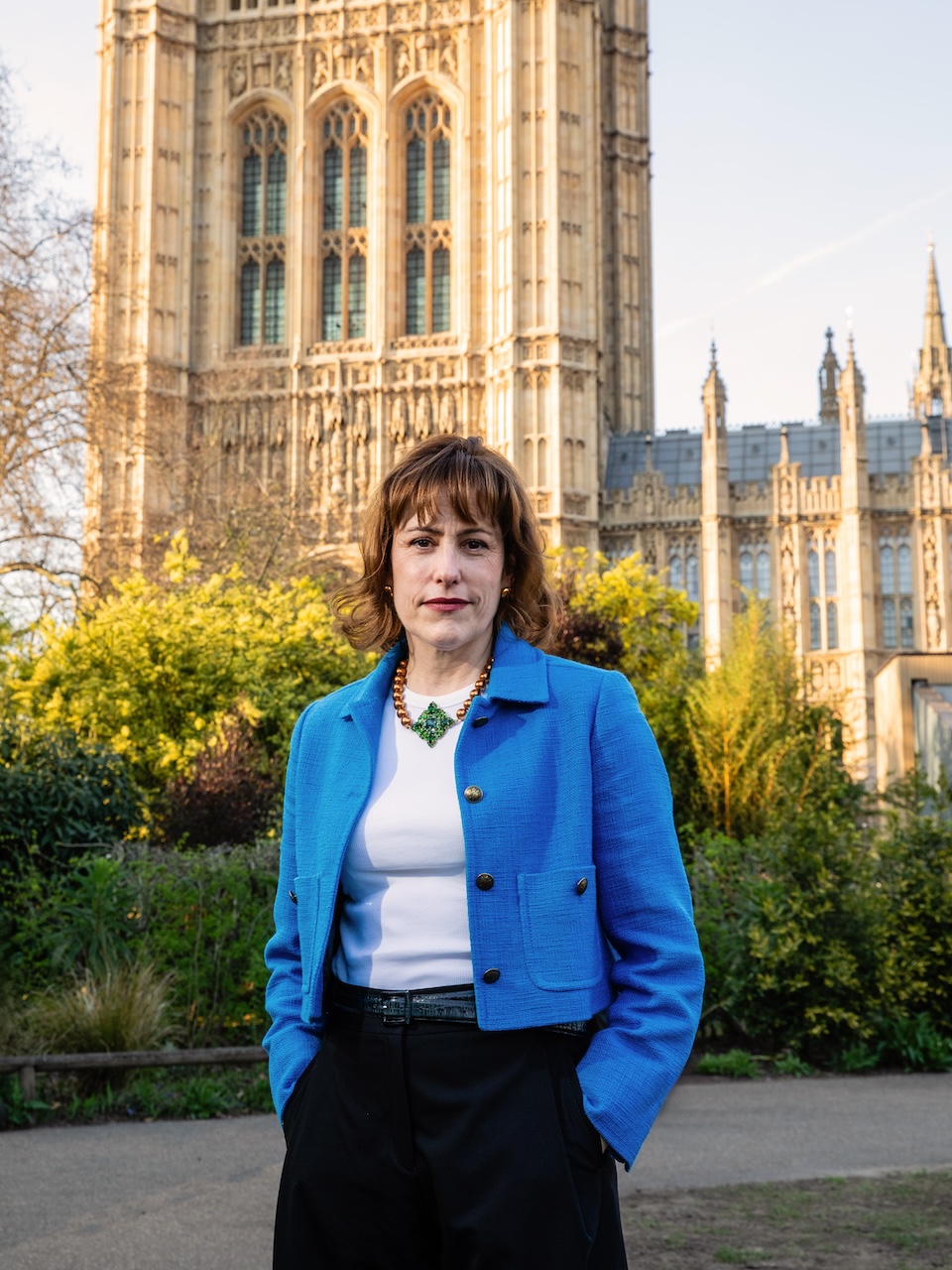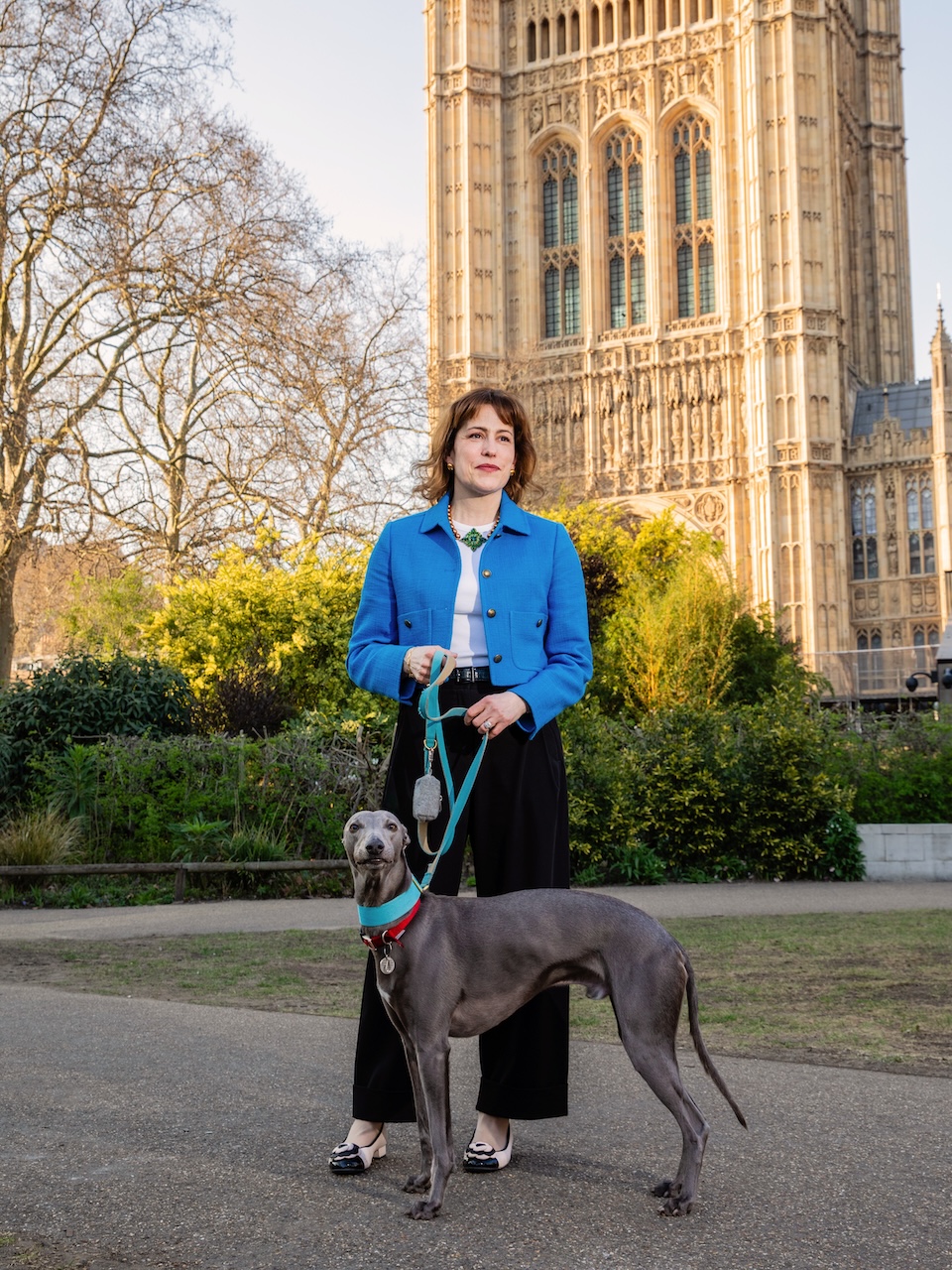Victoria Atkins: I’ve Cross-Examined Gun-Toting Drug Lords – Labour MPs Don't Worry Me
Victoria Atkins with her whippet, Bob (Photography by Louise Haywood-Schiefer)
11 min read
Sienna Rodgers talks to shadow environment secretary Victoria Atkins who aims her fire at ‘City Steve’, ‘showman’ Nigel Farage and the government’s ‘Marxist’ policy on compulsory purchase
“When I open my front door at home, I don’t see concrete, as Steve will do. I see fields and fields of wheat,” says Victoria Atkins, the Conservative Party’s shadow environment secretary and MP for the rural seat of Louth and Horncastle. She does not hold back when asked about her opposite number Steve Reed, who – given his London background and constituency – has been branded “City Steve” by the Tories.
“The whole time he’s been Secretary of State – some 265 days – he’s visited the grand total of four farms,” she adds, referring to a stat helpfully provided by the Department for Environment, Food and Rural Affairs (Defra) in response to a recent written parliamentary question. “We can see the lack of effort he has put into rebuilding relationships since the election.”
An extensive policy review means Kemi Badenoch’s shadow cabinet is heavily restricted in what it can say publicly; there is a “self-imposed silence while we’re creating policy”, as Atkins herself puts it. The shadow Defra secretary is cheerful, however: one of the few commitments Badenoch has made is reversal of the October Budget decision to cut the inheritance tax relief granted to agricultural land and business owners. Atkins has been free to make hay out of the government’s “family farm tax”, as she calls it.
With her shadow ministerial team, Atkins has embarked on a national tour of farms and auction marts. “Without exaggeration and without exception, every single event that we do, people are both furious but also utterly despondent, and feeling actually rather betrayed by the government. Because, of course, City Steve was the one who said to them it was desperate nonsense to suggest they were going to impose the family farm tax. They took him at his word, and then look what happened.”
“The difference between Steve and me is that in Labour circles, and one assumes Steve’s judgment is the same, they see Defra as a junior role that is a bit of a letdown,” claims Atkins, who was health secretary under Rishi Sunak.
Pointing out that she grew up in Lancashire “with the Trough of Bowland as the scene out of my bedroom window”, the shadow cabinet member – who was born in London and schooled in Blackpool – says: “I not only asked Kemi to be the shadow secretary of state for Defra, I very much love and enjoy what I’m doing.”
Reed may have close ties with No 10 chief of staff Morgan McSweeney, but it seems in this challenging fiscal climate he has drawn the shortest of short straws with Defra: as former environment secretary Michael Gove recently said, “the Treasury doesn’t like farms” and tends to regard farmers as “unproductive” and “subsidy junkies”. Sources say Reed has warned Labour colleagues – which now include a good number of rural constituency MPs – that they should be braced for further pain coming Defra’s way.
“I feel actually quite sorry for him, in a way, that his tenure in this department has been run by the Chancellor, and he’s never going to be trusted by the farming community again,” Atkins says of Reed. “But having said that, he’s still got the nice, shiny government car and the red box and the title, so I temper my pity for him with a feeling that he’s not doing too badly out of it.”
 Victoria Atkins (Photography by Louise Haywood-Schiefer)
Victoria Atkins (Photography by Louise Haywood-Schiefer)
Asked whether there is anyone from the Labour benches she would prefer to see in the post, the former barrister replies: “Look, I’m used to prosecuting criminals for a living. I’ve cross-examined gun-toting drug lords. With the very best will in the world, none of the Labour front bench, or indeed the back benches, fill me with any worry or concern.
“Indeed, only this morning, my colleagues were reminding me that when I was cross-examining one very, very, very senior drug gang boss, he burst into tears in the middle of my cross-examination and asked if he could change his plea to guilty.”
She has not made Reed cry so far, however. “I’ve made him look very, very upset – no, he hasn’t cried quite yet,” Atkins acknowledges.
Apart from the inheritance tax row, the Tories are also keen to highlight how the Sustainable Farming Incentive (SFI) scheme – the largest of the environmental land management schemes (Elms) – was suddenly closed to new applications in March. It had always been promised that at least several weeks of notice would be given, yet in the end there was no warning at all, disappointing farmers already experiencing a poor harvest.
“The untrammelled powers that the government is giving Natural England... That really is a step into Marxist territory”
“Farmers are a pretty resilient, tough bunch,” says Atkins. “It’s a difficult way to earn a, frankly, not terribly large living. Farmers always pride themselves on having a plan B, but one of my farmers said to me only recently, ‘I don’t have a plan B anymore’. That, I think, is shameful, and I genuinely don’t understand how Labour ministers look themselves in the mirror in the morning.”
The shadow Defra secretary is raising the alarm, too, about compulsory purchase orders. The government’s Planning and Infrastructure Bill will “unlock more sites for development” by ensuring that compensation paid to those whose land is compulsorily acquired can exclude “hope value”, i.e. any potential future increase in land value through, say, planning permission. It builds on the last Conservative government’s Levelling-up and Regeneration Act 2023, which allowed councils to ask ministers, on a case-by-case basis, to remove hope value.
While the Tories call these new powers “very, very worrying”, the government counters that the changes are not targeting farmers or any particular landowners – and insists that nothing in the bill changes the core principles of compulsory purchase.
“They’re right, in that it’s not just targeting farmers,” says Atkins. “It will also target anyone who has a large garden. Or if there’s a pond in your garden that has a great crested newt.
“The untrammelled powers that the government is giving Natural England means, as it stands, that organisation can demand and seize that little bit of your garden or your farmland. That really is a step into Marxist territory.”
 Victoria Atkins (Photography by Louise Haywood-Schiefer)
Victoria Atkins (Photography by Louise Haywood-Schiefer)
Does Atkins believe, like others on the right as well as many Yimbys (‘yes in my back yard’), that the Defra quango Natural England has an activist agenda and needs its powers reduced?
“I think that’s a fair question to ask. What is worrying about the bill, as it stands at the moment, is that Natural England, and indeed local councils, will be able to seize land and not pay the market value of that land to the owner,” she says.
“I’m afraid – just like I don’t buy this slightly Orwellian double speak language about the ‘grey belt’ – I don’t buy the ‘hope value’ language either. If a piece of land or a property has a market value, whether it consists of a hope value or anything else, it’s the market value.”
With the Health Secretary taking back control by abolishing NHS England, should the Environment Secretary be doing the same in relation to Natural England?
“I’m genuinely mystified as to why they’re talking about scrapping quangos, and yet, on the other hand, they are looking to massively increase the size and the power of Natural England,” replies Atkins.
“I don’t want to get ahead of myself with the policy review still ongoing,” she says when pressed for an answer, but hints: “We will be looking very carefully at what these quangos do to ensure that they meet not only our expectations in terms of stewardship of countryside, but also, importantly, the expectations of taxpayers.”
“I would love for the world to be able to reach net-zero by 2050, but we also have to be realistic”
So, what is the Conservative vision for farming? Should farmers prepare for a future without subsidies? “What I would like us to do is get to a place where not only are we supporting their nurturing of the public good, the environment and so on, but also ensuring that they are able to earn a good living from their activities,” Atkins says.
“I am very open to the idea that there needs to be more done to ensure that retailers are paying a fair price for the products that they sell. We have to do that, of course, whilst ensuring that everybody, regardless of their income, has access to good-quality, healthy food… It’s always been a very delicate balancing act.”
Atkins says she fears that the future of farming under Labour will be family farms going under, large corporations buying that land up, and no guarantee that they will continue to grow food. But while some – such as Jeremy Clarkson’s friend Harry Metcalfe, who runs popular YouTube channel Harry’s Farm – complain that none of the environmental agreements with farmers actually encourage food production, the Conservatives are not proposing anything so radical as scrapping those land management schemes.
“Farmers’ first and most important role is to feed the nation, to grow food, and so that must always take precedence. But equally, as a Conservative, I want to help them nurture the countryside as part of that. I don’t think anyone, including in the farming world, wants to go back to the days of the 1970s when there wasn’t that understanding about the impact that chemicals and so on can have on the soil,” explains Atkins.
And yet Badenoch has declared that the UK’s target of net-zero by 2050 is “impossible”. As a member of the Conservative Environment Network who spoke positively about the target while serving in the last government, is she comfortable with that pronouncement?
“I would love for the world to be able to reach net-zero by 2050, but we also have to be realistic about what that will mean in terms of the costs for people’s everyday lives,” she replies. “I do think Kemi is absolutely right that we’ve got to be realistic about this.”
 Victoria Atkins with her whippet, Bob (Photography by Louise Haywood-Schiefer)
Victoria Atkins with her whippet, Bob (Photography by Louise Haywood-Schiefer)
Clarkson’s Farm fan Atkins, 49, seems almost as proud of her rural constituency of 10 years as she is of her whippet, Bob, who joins The House for the photoshoot. Louth and Horncastle has long been a safe area for the Conservatives, but last July her majority was slashed from over 28,000 to just 5,500. Reform UK placed second.
Some believe it is inevitable that the Conservatives and Reform will have to work together at some point. How would she react to the idea of pacts at the next general election?
“No – the reason being that people who lead that party of protest are not themselves conservatives,” Atkins shoots back.
Why does she say Nigel Farage is not a conservative? “Well, first and foremost, his declared ambition is to destroy the Conservative Party. That’s a pretty good indicator.”
Or perhaps his ambition is to lead it? He has said as much in the past.
“He’s a great showman, isn’t he? And he makes us laugh. But his policies don’t make me laugh. I think they have pretty much ripped up whatever manifesto it was that they stood on in 2024. They made some announcements about their net-zero policy a couple of months ago – it was all banning and taxing – and then suddenly, within 24 hours, that had been ditched as well.”
Atkins suggests she would like to see more focus on the threat coming from the other side: the Liberal Democrats, who have launched their local elections campaign with the stated aim of replacing the Tories as the “party of Middle England”.
“I’m very conscious of how good the leader of Reform is at his own self-publicity. Actually, if you look at the maths, the Lib Dems are very much a party that we should have in our focus as well, in terms of under scrutinising their promises and scrutinising what they are presenting to the country,” she says.
“So, as I say, I treat every political party the same. I’m not going to give special treatment to one or another of them, because in a healthy, vibrant democracy, they have their place. We are clear, though: the others are parties of protest. We are not. We are a serious party of government and of policy.”
A test of whether the public agree will come in the upcoming local and mayoral elections. While Atkins may put the argument to voters that “if they vote Reform, if they vote Lib Dem, they’re going to get Labour”, as she does to The House, this line will no longer work if these “parties of protest” make real gains come 1 May.
